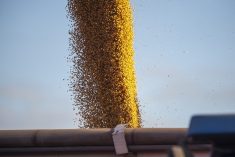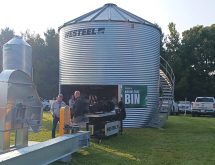Ontario grain handlers are struggling under the faster-than-normal progression of soybean harvest into corn harvest.
There are no reports of Ontario corn being stockpiled on the ground, but “with the vessel delays that we’ve seen at ports, there’s sometimes nowhere for the corn to go,” said Hensall Co-op grain originator and marketer Berkley Fedorchuk. “We’ll make things work as best we can.”
Why it matters: Farmers must take advantage of favourable weather to harvest crops but those without on-farm storage or limited storage can face challenges if there’s a glut of commodities at elevators.
Read Also

Claas brings 1000 Series SP forage harvesters to Canada
In mid-August, Claas unveiled its new line of Jaguar forage harvesters at an event in Visalia, California, deep in the heart of that state’s dairy region.
An Oct. 21 Reuters article reported limited storage at some Midwest elevators and long lines of trucks waiting to dump loads. The same article cited an Iowa corn producer who said he dumped some of his harvest on a pile “that looked like it held 1.5 million bushels.”
Fedorchuk said the Ontario situation is “pretty much exactly the same as in the U.S.”
As for piling corn on the ground, Mike Moulton, grain operations manager for the Port of Johnstown, said the situation hasn’t reached that point, but “requests for appointments to deliver to the port are getting close to an all-time high.”
“We call it the ‘trucker pipeline.’ And we’re hearing from a lot of truckers that the elevators and the growers are having trouble keeping up.”
Grain trader, farmer and owner of the Belleville-based Kell Grain elevator, Steve Kell says it’s unlikely Ontario could ever approach the storage back-ups experienced in the U.S. Midwest.
“Fundamentally, there’s a huge difference between” to two crop-growing powerhouses, he told Farmtario. And that difference is access to marine terminals – not just Johnstown but also Owen Sound, Goderich, Windsor, Port Colborne and Montreal. “If you go to Iowa or Nebraska there’s sometimes nowhere for farmers to go.”
But Kell agreed this year’s sustained good weather has created more significant bottlenecks than usual.
Fedorchuk said there are periods during most harvest seasons when country elevators’ ability to quickly move commodities to larger handling facilities affects farmers who deliver crops. This year, the sustained, province-wide sunny skies through late September and all of October allowed soybean harvest to continue unabated, with an immediate switch into corn harvest.
As well, there were delays early in the harvest season as port operators dealt with threatened labour disruptions.
Not just the weather
Port of Johnstown general manager Robert Dalley agrees that it’s “a familiar story” but advances in crop genetics and harvest technology are additional factors. Yields continue to grow and the speed with which farmers can harvest those yields and transport them to handling facilities continues to increase.
Dalley notes the municipally-owned facility has invested in more storage, including a just-opened corn drying unit that allows the port to accept wet corn into storage. That added to its overall capacity.
“In Ontario, soybeans go out by the vessel, whereas the corn mostly stays in the province,” he said.
Until this year, a significant amount of soybeans arriving at Johnstown had to be loaded and shipped before the facility could accept all the corn.
Moulton said the Port of Johnstown is taking in approximately 140 truckloads of grain daily.
“Last year was a record year for us,” added Dalley. “I don’t know if we’ll top last year by the end of it, but it might be close.”
Kell says the number-one rule for commodity marketing under these conditions is: “Don’t sell anything into the jam.”
“There is a point, especially when logistics get backed up, that somebody will sell for a reason other than getting a good price – just to get things moving.” He suggested this is happening to some degree now with soybeans. “Some of the beans that are being sold now are being sold because somebody needs them to move.”
But he cautions against “rewarding the market” by following suit.
If a grower hasn’t forward contracted sufficient bushels and finds themselves with no option but to sell, it could point to a weakness in their overall marketing strategy. But if you’re tempted, Kell continued, remember the comparison between the US Midwest and Ontario – where ocean-going vessels will eventually help ease the logistical strain.
“Yes, we (in Ontario) do get plugged up. But we plug up for 11 days or something like that.”
He expects any price depression caused by the bottlenecks will disappear by the middle of December, or even earlier. “There aren’t that many more acres left to harvest. This could wrap up astonishingly quickly.”















